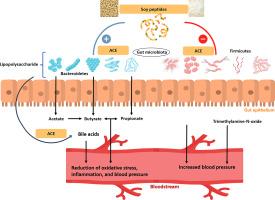大豆中的生物活性肽:抗高血压作用和肠道微生物群调节的最新进展
IF 3.8
2区 农林科学
Q2 FOOD SCIENCE & TECHNOLOGY
引用次数: 0
摘要
肠道微生物群(GM)与包括高血压在内的多种慢性疾病有关,新型治疗和管理策略已应用于这些疾病。当肠道微生物群中的固着菌/类杆菌比例失调时,就会出现菌群失调。高血压尤其与肠道菌群失调有关,目前影响着全球约 20% 的人口。与卡托普利等传统药物相比,植物肽(如大豆肽)具有独特的抗高血压前景。本综述提供了有关降压大豆肽及其机制的最新情况。文章讨论了转基因调节与高血压之间的联系,以及抗高血压和转基因调节大豆肽的生产,并列举了一些实例。研究缺口和推断信息表明,需要进行大量研究,以证明具有转基因调节作用的降压大豆肽的健康声明和可能的使用。本文章由计算机程序翻译,如有差异,请以英文原文为准。

Biologically active peptides from soy: Updates on antihypertensive action and gut microbiota modulation
The gut microbiota (GM) is associated with several chronic diseases including hypertension, to which novel therapeutic and management strategies have been applied. A dysbiosis is said to occur when there is an imbalance in the GM's Firmicutes/Bacteroidetes ratio. Hypertension in particular is linked to a dysbiotic gut and currently affects about 20 % of the world's population. Plant-based peptides such as soy-derived peptides offer a unique antihypertensive prospect as against the conventional use of medications like captopril. This review provides status updates on antihypertensive soy peptides and their mechanisms. The link between GM modulation and hypertension, and the production of antihypertensive and GM modulatory soy peptides are discussed, with some examples. Research gaps and deduced information suggest that substantial studies are warranted to justify health claims and the possible use of antihypertensive soy peptides with GM modulatory effects.
求助全文
通过发布文献求助,成功后即可免费获取论文全文。
去求助
来源期刊

Journal of Functional Foods
FOOD SCIENCE & TECHNOLOGY-
CiteScore
9.60
自引率
1.80%
发文量
428
审稿时长
76 days
期刊介绍:
Journal of Functional Foods continues with the same aims and scope, editorial team, submission system and rigorous peer review. We give authors the possibility to publish their top-quality papers in a well-established leading journal in the food and nutrition fields. The Journal will keep its rigorous criteria to screen high impact research addressing relevant scientific topics and performed by sound methodologies.
The Journal of Functional Foods aims to bring together the results of fundamental and applied research into healthy foods and biologically active food ingredients.
The Journal is centered in the specific area at the boundaries among food technology, nutrition and health welcoming papers having a good interdisciplinary approach. The Journal will cover the fields of plant bioactives; dietary fibre, probiotics; functional lipids; bioactive peptides; vitamins, minerals and botanicals and other dietary supplements. Nutritional and technological aspects related to the development of functional foods and beverages are of core interest to the journal. Experimental works dealing with food digestion, bioavailability of food bioactives and on the mechanisms by which foods and their components are able to modulate physiological parameters connected with disease prevention are of particular interest as well as those dealing with personalized nutrition and nutritional needs in pathological subjects.
 求助内容:
求助内容: 应助结果提醒方式:
应助结果提醒方式:


